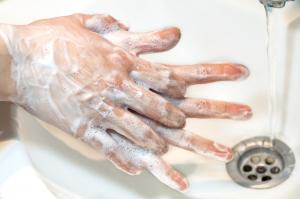Clean hands help stop spread of infections
Date published:

Good hand hygiene
Good hand hygiene is one of the most important tools in preventing illnesses. It can help protect you and your family.
Overuse or misuse of antibiotics makes them less effective over time. So the next time you pick up an infection, the antibiotic may not be as effective or even work at all.
That risk can be reduced by simply washing your hands properly. It will reduce the possibility of spreading illness and means antibiotics are kept for when they’re needed most.
Simple hand-washing steps
By following the steps below, everyone can make sure they have clean hands:
- wet hands with warm water
- use enough liquid soap to cover the surface of both hands
- rub hands together, soaping all areas (including the backs of the hands and between the fingers)
- rinse hands with warm water
- dry both hands thoroughly
You can find out more on the following page:
Antibacterial hand gels and wipes are not a substitute for washing hands, as gels and wipes may not adequately remove germs and bugs in the way that running water can.
However, using such gels after hand washing with soap and water may reduce the risk of picking up these infections.